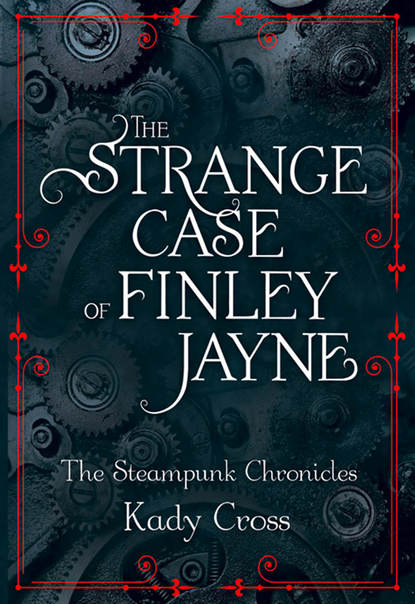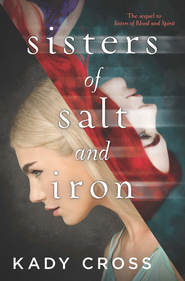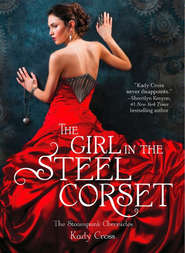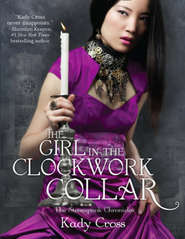По всем вопросам обращайтесь на: info@litportal.ru
(©) 2003-2024.
✖
The Strange Case of Finley Jayne
Настройки чтения
Размер шрифта
Высота строк
Поля
Miss Clarke slapped the boy, and then Finley punched Miss Clarke.
How was she to know the woman’s teeth were so brittle that they’d fall out? They’d certainly been healthy enough to cut Finley’s knuckles. And not having much experience with violence, how was she to know that “normal” girls weren’t supposed to have the strength to send a full-grown woman, three stone heavier than herself, flying backward several feet?
As she lowered her bag to her side and walked toward the stairs to the street, Finley had to be serious long enough to realize that she hadn’t been fired for striking the governess—Mrs. Brown struck the maids all the time. She’d been fired because there was something wrong with her.
She wasn’t right. Was it the work of the devil? She didn’t feel evil. Even when that darkness came over her and made her do the things she shouldn’t do, it didn’t feel wrong or bad. And she wasn’t going to apologize for knocking Miss Clarke on her fat behind when the older woman had brought a child to tears.
The memory of it made her grit her teeth as she climbed the cracked and crumbling stairs. Even the smells and sounds of Mayfair didn’t dent her anger. And now she had to walk through Grosvenor Square with hair frizzy from working a steam press all morning. If she’d known she’d get sacked she would have hit the cow harder.
She stopped two steps from the street. This was exactly what was wrong with her. She’d be thinking—could be about nothing in particular—and she’d have a dark thought, like hitting someone, or saying something true, but cruel. But unlike regular people, sometimes she couldn’t help but give in to temptation.
Perhaps it was the devil, after all.
Just like that, her anger receded, leaving a ball of fear and dread in her belly so cold and hard it felt like lead. She was unemployed in a city where good jobs for a girl were scarce, and without a reference.
She was, as her stepfather would often say when he thought she couldn’t hear, “buggered.”
The thought of her parents only brought her mood down lower. How was she going to explain to them that she’d lost her position because she couldn’t control herself? They didn’t know about these strange incidents. When she was younger they were so infrequent she barely gave them a thought, but they started getting worse shortly after she got her first monthly, and now happened regularly enough—and without warning—that oftentimes she wasn’t even aware anything had happened until it was far too late.
She couldn’t tell her parents the complete truth, but she had to tell them something. As of today she had no place to stay, and proud as she was, even she wasn’t foolish enough to spend the night on the street.
There were things far more dangerous than her in London.
Her mother made hot chocolate.
Finley smiled guiltily at the steaming mug. She knew it would taste like heaven, even when the toast she dunked in it left a buttery haze on top. “You didn’t have to do that.”
“Nonsense,” her mother, Mary, countered, taking a seat at the table. She had her own mug, as well. “We haven’t done this for a long time.”
It really hadn’t been that long, but sometimes it felt like years since she’d left home. “I’m sorry to intrude upon you like this.”
Her mother’s warm hand closed over one of hers. “Dearest, this is your home, and it always will be. You could never intrude upon Silas and me.”
Finley stared down at the scarred, yet polished tabletop. Her mother and Silas weren’t poor, but they weren’t wealthy, either. The bookshop they ran did a solid business, but life would be easier for both of them without the burden of an extra body to clothe and feed.
If only she hadn’t hit Miss Clarke. If only she could bring herself to feel badly for it. She didn’t. She felt badly for being here, leeching off her parents, but she didn’t feel one ounce of remorse for what she had done—only the consequences of it.
“You’ll find a new position,” her mother added, giving her hand a squeeze. “And they’ll be glad to have you. Only next time, try to keep your mouth closed.”
Finley glanced up in time to catch her mother’s smile. She hadn’t been completely honest, nor had she lied precisely. She told her parents that she had lost her job because of an altercation with the governess who was favored by the mistress of the house. That was all true. She simply left out the part about causing that same servant to swallow her own teeth.
“I will, Mama,” she promised, trying to force her own lips to curve.
Slowly, her mother’s smile faded away, replaced by an expression of concern that tightened the corners of her pale blue eyes. Finley had often wished her eyes could be that color, but as she grew up she began to appreciate that she had something of Thomas Jayne about her.
“Has something else happened?” her mother asked. “Is there something you want to talk about?”
Words teetered on the tip of her tongue, just waiting to spill out and confess everything, but Finley bit them back. “No. I’m just disappointed in myself.”
“Learn from it and then let it go. Dwelling never helped anyone.” A strange expression crossed her face. “You must believe me in this.”
For a moment Finley wondered, as she often did when her mother was particularly cryptic, if she referred to Finley’s father. She had never known her real father, and though Silas had been as good to her as any father could, she often wondered about the man.
She wondered if she looked like him—her mother said she did. She wondered how many things that she enjoyed or disliked had come from him. And she wondered, of course, if he might have been a little mad. Her mother never came out and said such a thing, but there were secrets where her father was concerned. Finley had never even been to his grave. Her mother claimed she wouldn’t know where to find it in the graveyard, she’d been so grief stricken, but Finley sometimes thought that was a lie.
Perhaps it was better that she didn’t know the truth.
“I will try not to dwell on things, Mama,” she promised. “And I will begin to look for a new position first thing tomorrow morning.”
Her mother gave her fingers a light squeeze. “I know you will, but I want you to find something that suits you, so don’t rush in to the first employment you find. You may stay here as long as you want, and take time to find a post where they will treat you well.” A slight smile curved her lips. “One where they hopefully do not employ a governess.”
Finley laughed. Laughing made it seem like everything was going to be all right. She would find a new job and there was nothing wrong with her. If only she could keep laughing, she might just believe it.
CHAPTER TWO
Fate, it seemed, also had an odd sense of humor, because Finley didn’t have to go looking for new employment the next morning; new employment came looking for her.
She was in the small parlor in their apartments above the bookshop, taking tea with her mother and mending a tear in one of her best dresses with the small steam-powered sewing engine, when Silas came up from the shop, his lean cheeks pale.
“Silas,” her mother began in a concerned tone. “Whatever is the matter?”
“There’s a Lady Morton in the shop,” he told them. “She says she’s here to see Finley.”
Finley’s hand froze on the lever that operated the machine’s engine. She looked from her mother’s surprised face to Silas’s and then back to her mother. They knew of Lady Morton, of course; she was frequently mentioned in the society pages. “What could she want with me?”
“She didn’t say,” Silas replied. “And I’m embarrassed to say I didn’t know how to ask.”
Slowly, on knees that trembled ever so slightly, Finley rose to her feet. Lady Morton was a friend to Lady Gattersleigh—mother of little Fenton, whose governess she had jobbed in the mouth just the day before.
Was the lady there to make her life even more unpleasant? Tell her mother and Silas that she was unnatural? Perhaps she was being overly pessimistic, but she didn’t see how this visit could possibly end on a positive note.
“Should I bring her up?” Silas asked, turning now to his wife, who looked horrified at the prospect of entertaining an aristocrat in her humble home.
“No,” Finley answered, partially because she didn’t want to embarrass her mother, but mostly because whatever Lady Morton had to say, her parents didn’t need to hear it. “I’ll attend to her ladyship downstairs. Excuse me.”
She didn’t look at either her mother or Silas as she made her way to the door that led downstairs to the shop. She held her head high and shoulders back and tried to keep her knees from visibly shaking. She would not be afraid. This woman could do nothing to hurt her any worse than Finley had already done to herself.
When she reached the bottom of the stairs and peered out around the entrance to the shop, she saw the lady standing in front of a shelf of leather-bound volumes of poetry by Byron. Ladies always seemed to enjoy the romantic poet’s work. A few feet away from her, Silas’s automaton assistant, Fanny toiled at dusting the packed shelves.
Fanny was a little shorter than Finley, but had arms and legs that could lengthen if needed. She was programmed to do menial tasks around the shop—such as dusting and shelving books. She had no voice box and did not respond when spoken to. Still, Finley felt as though the skeletal machine was part of the family.
Lady Morton was perhaps in her mid-to late thirties. A handsome woman with dark hair and pale green eyes—or rather, one pale green eye. The other was a curved, smoky lens that fit beneath her top and bottom lid. It was like looking into a storm cloud and seeing your own face reflected. Finley didn’t know how it worked, but apparently the lens worked much like an eye did, only better.
She wore a dark plum day gown with a pearl-gray shawl and matching hat. Finley glanced down at her own stockings, boots and short skirt and grimaced. Her clothing was very modern—not the sort of thing one wore to receive polite company.
Nevertheless, she was not going to put this off any longer. Better to just get it over with, like tearing a bandage off a cut.
“Lady Morton?” she inquired as she stepped into the shop.











